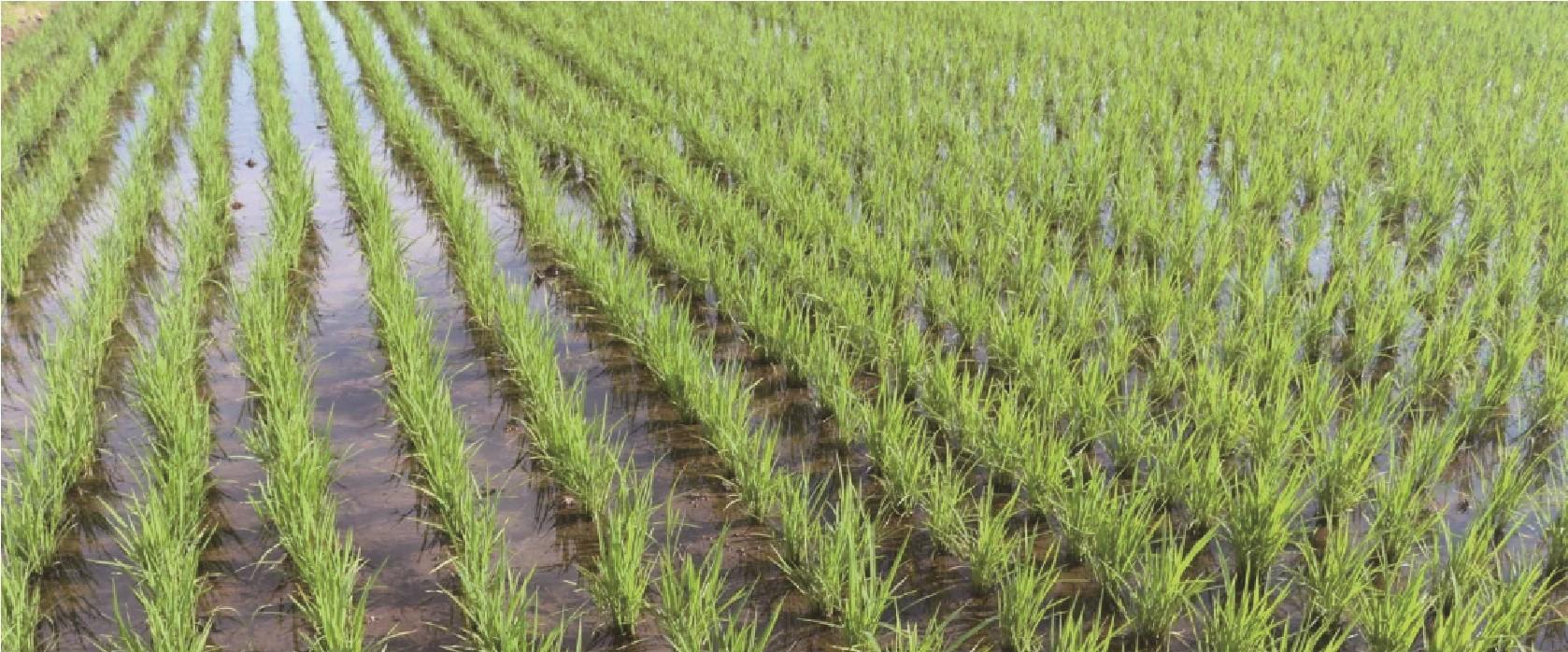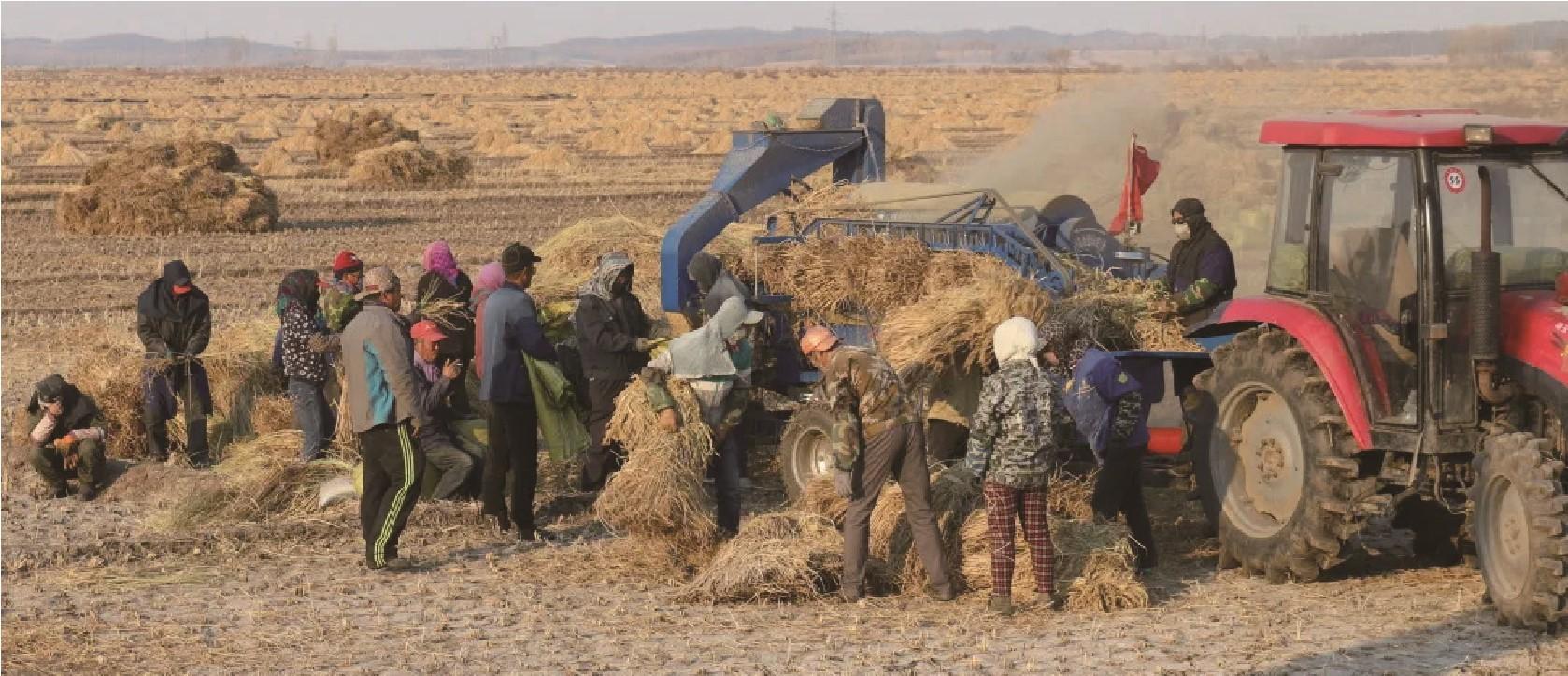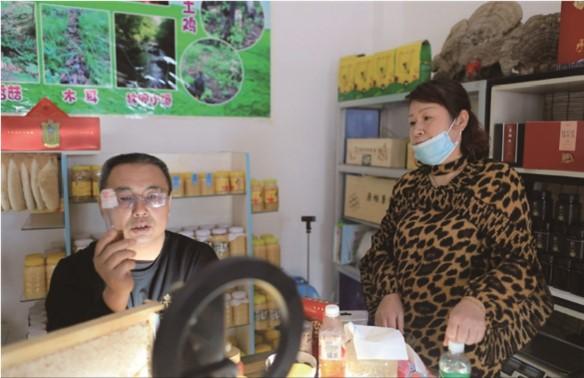
Wuchang rice fields
Featuring unique geographical conditions, including semi-mountainous terrain, a 55.9% forest coverage rate, three major river systems full of nutritious minerals, and highly fertile, loamy soil in its northwest plains region, as well as a middle-temperate, monsoon-influenced, humid continental climate with hot summers and cold, dry winters, Wuchang City, Harbin City, Heilongjiang Province, is one of China’s important commodity grain-producing administrative areas. Especially suited to rice cultivation, crops such as corn, soybeans, sorghum, and wheat are also grown in the city. A superior type of the Japonica rice variety common in East Asia with a light, slightly sweet flavour; soft, somewhat sticky texture; and appealing fragrance derived from the high-quality Wuyou cultivar, which only produces its characteristic aroma and flavour in the Wuchang area, high-yield and high-calibre Songjing “super rice,” which is resistant to pests and diseases and tolerant to other stresses among other useful traits it possesses, and other top-grade cultivars known as Wuchang rice is produced in its borders and is one of its signature specialities. In recent years, land area devoted to standardised cultivation of the cultivar has been expanding in Wuchang; the reputation of Wuchang rice has been growing; and the “Wuchang model” of rural development, which refers to the corresponding approaches and techniques that are involved, has gained recognition throughout China. Wuchang rice was awarded the gold medal for best-quality rice in all of China at the 2018 national rice brand appreciation competition as well.
In recent years, various measures designed to help Wuchang’s residents take advantage of the high-quality agricultural produce that is grown in its borders by stimulating e-commerce development have been implemented in order to boost incomes. Logistics networks have been extended into its villages; public service offerings that help incubate e-commerce entities have been created and improved; cooperative arrangements designed to build agricultural brands and enhance sales have been made with major Chinese e-commerce companies; and a traceability system that promotes quality management has been developed.
The efforts have helped e-commerce businesses of all sizes mushroom in the city’s rural areas. In 2019, its total e-commerce transaction volume reached RMB3.55 billion, with rural e-commerce accounting for RMB810 million – a year-on-year increase of 35%.
Qiyi Becomes a Taobao Village
Qiyi became the first Taobao Village in Heilongjiang in 2019. At the end of 2020, 546 households existed in the village, 340 of its residents were engaging in e-commerce-related work, 134 online stores were being operated in the administrative area – 85 of which were hosted on the Taobao e-commerce platform – a total of 2,000 tonnes of rice had been sold online throughout the year, accounting for nearly RMB29 million in sales, and total revenue came to more than RMB50 million.
“It’s not easy to become a Taobao Village,” Qiyi village official Zhou Wei noted proudly in 2020, explaining that the title refers to a village in which residents got started in e-commerce primarily via the Taobao Marketplace consumer-to-consumer retail platform, at least 10% of families are actively engaged in e-commerce or where there are at least 100 active online stores, and total online sales exceed RMB10 million (US$1.56 million) per year.
Many of the young people who were born in Qiyi but had been working elsewhere have returned to the village in order to launch businesses since e-commerce began taking root in its borders and in rural Wuchang in general. Diversifying their offerings, Qiyi’s online stores have also been selling products like honey, edible fungi, and soybean paste and oil in addition to rice and other grains.

Farmers harvest rice in Wuchang
A Qiyi resident who grows rice across a little over 10 mu of paddy fields named Chen Honggang became the first person in the village to sell the crop online. Moving 3,000 kg’s worth the month he started over a decade ago, his business has been very popular ever since. Chen also began buying rice from farmers who live in the area who had previously been selling their crop to various mills in other locales as his business expanded in order to increase his supply, which increased their profits.
The rice that Chen grows and purchases is exclusively sold online. He has been sharing short videos covering assorted aspects of rice farming on a section of the WeChat social media platform where pictures, text, and website links can be shared in a timeline-style format known as Moments on both of the accounts that he uses on the app. He starts recording them when the sowing process begins in March and continues to do so until harvest season arrives in the fall and freshly harvested rice is about to become available, which is when business begins to boom. Chen has contracted more than 600 mu of land for rice farming purposes through land usage right obtention and other methods in order to ensure that he has sufficient supply as his annual sales have grown from tens of thousands of jin’s worth of rice to hundreds of thousands of jin’s worth and even more than a million jin’s worth.
Some of Qiyi’s young people began following suit after they became aware of the success that Chen was experiencing. The first group of people that launched e-businesses in the village eventually built their own rice factories and have thus achieved vertical integration spanning cultivation, processing and sales. E-commerce income accounts for 70% to 80% of Qiyi’s total revenue as of early 2021.
Zhang Wenqin and her husband opened a Taobao store specialising in rice in 2015. She noted that although her sales were fairly good compared to Qiyi’s other online shopkeepers, they were not in the upper echelon. The couple sold a few hundred kilograms’ worth of the product per day in the beginning but now sell an average of about 1,500 kg of rice per day and over 5,000 kg per day during peak sales periods as of mid-2020, however.
At first, agricultural vehicles took Qiyi merchants’ packed orders to central Dujia, where they were shipped out of the local area at the rate of RMB4 per kg. The extension of logistics networks into rural areas that Heilongjiang and its administrative areas began engaging in from around 2014 to 2018 revolutionised the situation, however. Parcels were able to be picked up at service stations in villages and they could be sent at the rate of around RMB1.4 kg depending on their total weight and exact journey when an e-commerce logistics park opened in Wuchang in 2018, which improved efficiency and decreased costs for customers, greatly boosting the e-commerce efforts in the area and attracting more orders.
Zhang and her husband eventually built their own factory capable of threshing, processing, and packing rice after they began experiencing greater demand and logistics improved, which enhanced productivity.

E-business operators promote products on a livestreaming platform.
Qiyi native Tai Yuanye began working abroad in 2008 shortly after he turned 18. He returned to his hometown in 2015 in order to be near his aging parents but worried about how he would make a living back in the village.
He soon became inspired by Chen and the other Qiyi residents who had succeeded in selling rice online, however, so he decided to pursue the endeavour as well. Tai’s mother provided him with RMB10,000 of start-up funding, which he used to purchase a vacuum baler, a computer, and cartons, and he launched a store on Taobao soon after.
“I didn’t receive many orders at first, but I wanted more people to become aware of delicious Wuchang rice and gain the ability to purchase it as long as I didn’t lose money,” recounted Tai in early 2021, explaining his initial goals.
The entrepreneur sold some of his packaged rice at lower-than-average prices as part of this concept and was receiving dozens of orders a day within several months, which was enough for him to break even and thus attain his preliminary objective. He struggled to turn a profit for a while, however, which was his next aim, until he finally experienced a surprise breakthrough in late 2015.
“On the morning of Dec. 12, my father woke me up and asked me to check if my phone was broken because it kept ringing,” Tai recalled, who discovered that more than 100 orders had poured in.
He ultimately received a total of more than 300 orders during that year’s Double 12, a major shopping festival that takes place on and around Dec. 12 in China.
Feeling more confident about the endeavour after his sales performance began improving, Tai decided to invest RMB70,000 into his business in order to improve areas such as photography and décor, online store design, marketing and operations.
Tai’s family had been growing rice on more than 20 mu of land and achieving over 15,000 kg of yields per year at the time. Tai established the Wuchang Gubang Rice Cultivation Cooperative in 2016 and expanded the rice fields to an area of more than 200 mu afterward, which increased annual output to over 150,000 kg.
Tai’s family mostly depended solely on traditional agricultural sales methods for income in the past and brought in around RMB50,000 to RMB60,000 of revenue a year. Their income has increased significantly as their Taobao business has grown, however.
Tai and his wife handle most of the work related to the family’s Taobao store, and Tai’s parents help with packing and shipping during major shopping festivals. Sales were mostly steady in 2020 despite the fact that the COVID-19 pandemic affected many businesses, and the store’s annual revenue reached RMB3 million that year. At the end of 2020, Tai purchased an automated nitrogen packaging machine, which preserves his rice better and packages it more efficiently than the equipment that he had been using before.
“It is no exaggeration to say that Taobao has changed my life,” the businessowner mentioned.
“I bought a car the first year I ran my Taobao store, and I purchased a new home in central Wuchang last year,” Tai concluded. “I have finally gained the ability to improve my family members’ lives through my own efforts.”

For more information, please contact WFP China COE (wfpcn.coe@wfp.org)
Category
Rural E-commerce Revolution Enables Qiyi Village's Rice Farmers to Transform Their Lives
Contributor
Rural E-commerce Revolution Enables Qiyi Village's Rice Farmers to Transform Their Lives
Country
Story

